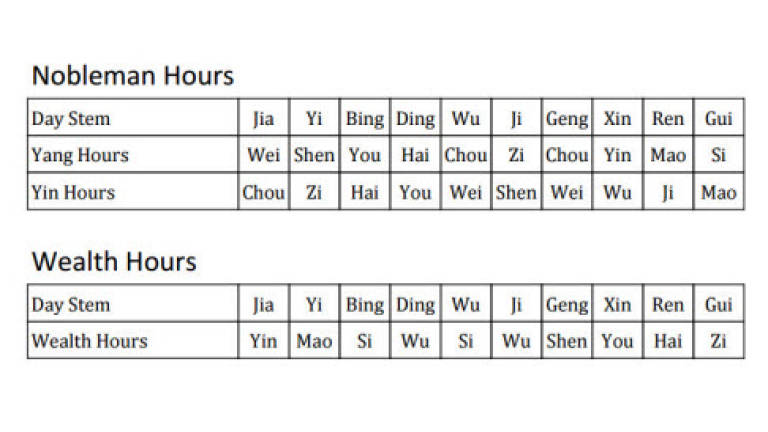Classical Feng Shui - Getting the timing right


After selecting an auspicious date for a particular activity, you need to pick an auspicious time.
But how do you go about selecting an auspicious time to increase your good fortune?
Before we venture into hour selection, you’ll need to know that for the Chinese, each hour is 120 minutes long, giving 12 Chinese hours in a day.
The first Chinese hour is called Zi Shi, and it starts at 11pm and ends at 1am. The second Chinese hour is called Chou Shi, and starts at 1am and ends at 3am.
Subsequent hours are known as Yin Shi, Mao Shi, Chen Shi, Si Shi, Wu Shi, Wei Shi, Shen Shi, You Shi, Xu Shi, and finally ending with Hai Shi, from 9pm to 11pm.
Like Day selection, there are also formulas or methodologies for selecting auspicious and inauspicious hours.
If you refer to the Tung Shu (Chinese Almanac), hours are characterised as either good, bad or neutral. In this article, I will try to throw some light on how these conclusions were reached.
Remember that Chinese time is always a 120-minute block. For example, when you ask a consultant for the optimal time to install your new bed, it is always a block of 120 minutes, such as between 1pm and 3pm and never a specific time, for example, like at 1.26pm.
Let’s start with the most inauspicious hour. It is called the Day Breaker hour, and it is the Chinese hour that clashes with the Branch of the day.
Let’s say the Branch of the day is Zi. Since Zi always clashes with Wu, the Wu hour (between 11am and 1pm) is considered the Day Breaker hour, the most inauspicious hour of the day, and should be avoided for all activities.
Let’s take another example. Let’s say that the Branch of the day is Si. Since Si clashes with Xu, the Xu hour (between 7pm and 9pm) is the Day Breaker hour, and should be avoided.
In addition to the Day Breaker hour, there is the Punishment Harm hour, which follows similar principles as the Day Breaker hour, but which fortunately, is not as serious.
There are other inauspicious hours, but most are salvageable, meaning that you can still carry out activities if you take precautions.
As for the auspicious hours, there are a number of of them, but the more popular ones include the Nobleman hours and the Wealth hours. (See the diagram)
The Nobleman hours are highly auspicious. They generate positive results and are strong enough to neutralise negative influences.
The Yang hours are good for external matters, while the Yin hours are good for domestic matters.
The Wealth hours, meanwhile, are good for wealth-seeking activities.
They are also good for making plans, seeking a position, moving house, marriage, signing agreements, and for construction work.
Then, there is the Horse hour, which is good for starting a journey or a business, or for seeking a position or recognition.
I would also like to highlight two more auspicious hours. They are the Heavenly Officer hours and the Fortunate hours.
The Heavenly Officer hours are especially good for matters that require discipline, such as worship, starting a new business, business transactions, signing agreements, travelling, taking up a new position, and so on.
The Fortunate Hour, on the other hand, is good for worship, opening a business, conducting business transactions, having a house warming, moving house, marriage, funerals, burials, and travel.
Other noteworthy hours include the Establish hour, Six Combo hour, and Three Harmonies hour.
Here’s a story about a real life-moving house experience.
A client called and said that the auspicious hour that I gave to him – between 9am and 11am – was too short to move all his stuff into the house.
That is when I realised that I did not make myself clear to him.
The auspicious time is the time you should start moving things into the house, not the time to start and complete the move.
Once you have started moving stuff into the house at the auspicious time, you can continue doing so for the rest of the day, or even the next day, the next week or longer.
Henry Fong is an electronic engineer by qualification and he approaches feng shui with the same analytical and investigative approach he uses in his training. Readers can write to him at lifestyle.henryfong@thesundaily.com.